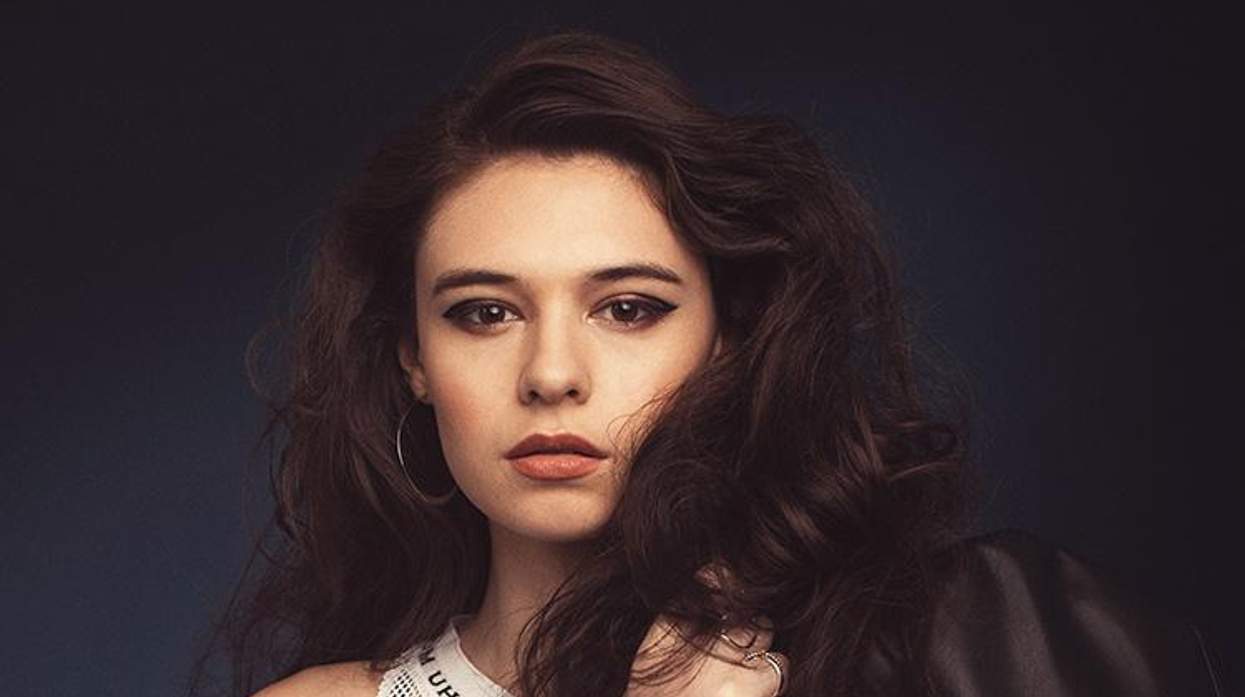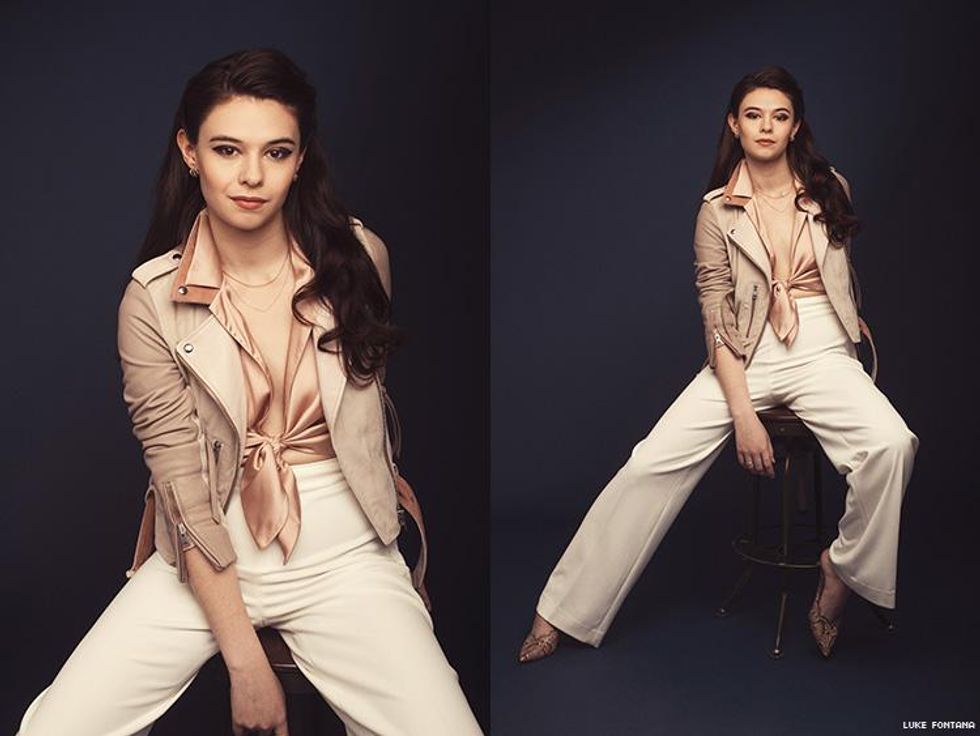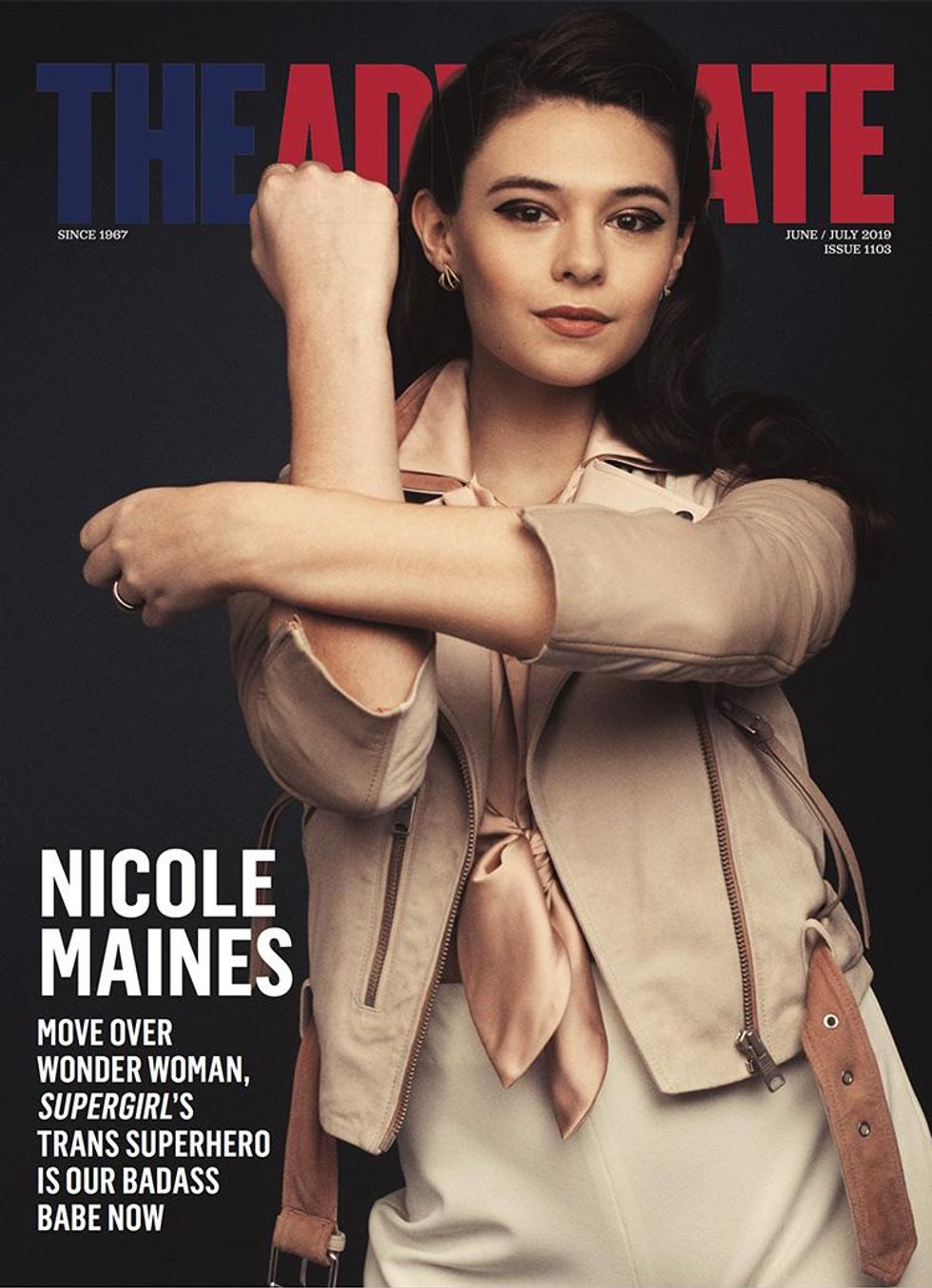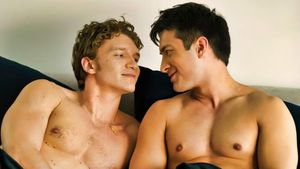The CW's Supergirl is showcasing the power of the press, says Nicole Maines, who plays reporter Nia Nal (a.k.a. Dreamer). "This is really a season about portraying journalists as superheroes," she explains. "When we have a president who's trying to vilify journalists, then you guys really are heroes."
When the show's creative team was planning the fifth season, Maines says they wanted create an enemy "that the Super Friends couldn't necessarily fight with their fists or with heat vision." The show's writers found their adversary in the leader of a human supremacist group who's "fanning the flames of hatred and bigotry in National City." Even after he's imprisoned, the city continues to be ravaged with problems. "How do you fight fear? " Maines asks. "How do you fight ignorance and hatred and bigotry? That's not something you can punch."
The parallels are all too real given the constant attacks on immigrants, reporters, and trans people like Maines. At 21, the actress has already had a life of fighting the kind of bigotry she tackles on TV.
In 2007, Maines first challenged her elementary school over bathroom access. The case went to the Maine Supreme Court, which ruled in 2014 that denying a trans student access to a bathroom that matched their gender identity was unconstitutional. Since then, she's advocated for LGBTQ rights, appearing in the HBO documentary The Trans List and in the book Becoming Nicole: The Transformation of an American Family. At 17, Glamour named her Woman of the Year. She's also received honors from HRC and the Matthew Shepard Foundation.
These days, her acting career is taking center stage on a show that could not be more relevant. Her screen work is reminiscent of Wonder Woman's Lynda Carter -- who is, ironically, now Maines's costar on Supergirl, playing U.S. President Olivia Marsdin.
The show delivers plenty of timely issues, including immigration. Maines, who accepted the role before she even knew the storyline, says, "I knew that I was going to play a trans woman and I knew I was going to play a reporter and I knew I was going to play a superhero." Once she found out about how they were going to draw a parallel to America today, she knew this was "a story that needs to be told."
"This is what we need in a superhero show," says Maines. "We have a show about... otherworldly refugees coming to Earth, coming to National City. What would that look like? It would look like you know a lot of people saying aliens are coming to take our jobs, they're dangerous. The exact same conversation we're having with immigrants today... How do you make sense of it all? How do you combat people's fears?"
Without a doubt, Supergirl is attempting to challenge the hearts and minds of its viewers. "I think superheroes are a great way to talk about these issues because superheroes are a huge staple in American culture and something everybody's familiar with," Maines says, adding that by using superheroes to talk about things like xenophobia or homophobia, it can make such topics more approachable in real life. The camp aspect of it all keeps it light.
"I am not reading my news app and crying and freaking out," admits Maines, "At least I'm seeing this through Supergirl. At least that's how I cope with it."
Using fantasy as a tool to talk about political issues isn't new. Films like Iron Man, Captain America, and Superman have managed it successfully -- using historical enemies, like Nazis, and even setting the time amid the backdrop of the Cold War. Superheroes have always existed at the intersection of culture and politics, but Maines says it hasn't always resonated with everyone, especially radical right-wingers who'd rather take politics out of superhero movies. "People are only upset about it now because, for the first time, they are on the other side of it," she explains. "The enemy is potentially at home. It's not overseas, it's not someone you can point at."
Playing Nia makes Maines an even bigger role model as well, and she feels that love on social media. While she feels enormous pressure being the first trans superhero, Maines admits it's easier because she's not the first trans character on TV.
"We are exiting the era of television where trans characters feel a need to explain themselves," she says. "Where all trans characters are the trans characters and that their role on the show is to educate other characters...[and] the audience about what it means to be trans. I don't have to be necessarily the trans superhero. I can be a superhero who is trans."

"What an amazing trajectory to know in 50 years we can go from being a completely isolated community and being thrown in jail for wearing the wrong article of clothing to being on television in a super-suit, and being seen by everyone," she adds. "Not just people in our community but people outside of our community, people across the country, across the world are seeing us."
Maines hopes that Hollywood will now be more open to cast trans actors in trans-specific roles, mainly because of the effects it has off-screen.
"One of the arguments that I see is, 'Well it's acting, it's pretending.' Well yes, but you also have to take into account how that is reading to someone sitting on their couch watching -- someone who has never seen a trans person before. If you cast a man and put him in a dress and say this is what 'trans' looks like, well then that's where we get the whole 'men in dresses' argument. That's why I feel it is so important, because we are actively combating that narrative that trans people are somehow pretending or playing dress-up."
While she thinks equal opportunity for gay actors, for example, should be a consideration, the rest of the arguments aren't the same. "No one is going around saying that gay people are straight people pretending to be gay to get into gay functions. No one is saying that. There's not that harmful narrative reinforced [when compared to the trans narrative]."
Though Maines is quickly racing to the top of the Hollywood A-list, she can't help but be anxious, especially since she's now part of an industry with so much rejection. That's why she's choosing to "stop, smell the roses," and "be very, very happy, be very thankful."
Of course, that includes finding love. At 21, Maines is "single as a Pringle," she jokes, and the men she meets in Vancouver (where Supergirl is filmed) are often outdoor adventurers.
"I feel like all the guys in Vancouver are like, 'Let's work out, let's go skiing!' And I'm like, 'Let's not.' After a 16-hour day, the last thing I want to think about is working out. I'm going to sit on my couch in my sweatpants eating ice cream and...rewatching The Office."
Her family back in Maine have been a great support, especially in helping cut through red tape so she could continue her hormone treatment while filming abroad. She jokes about the difficulty of working with insurance in the U.S., living in Canada part of the year, and no longer being able to have her mom mail hormones across the border to her on set. "Look at me smuggling estrogen across the border," the baby-faced Maines quips. "I am the face of crime."
Maines's new vampire movie, Bit, premiers soon. "It's freaking great," Maines boasts. "I play a transgender girl from Oregon who visits her brother who is an actor in Los Angeles, and she falls in with a gang of intersectional feminist vampires in Los Angeles -- and it is amazing."
Hollywood clearly has a new superstar on the rise. And to whoever is casting the new Avatar: The Last Airbender reboot, Maines says she's waiting for their call. Oh, and she's game to do a Star Wars flick too.
"Superhero and Jedi," says the young starlet, exposing her inner geek girl. "Those are where the goalposts are."
RELATED | Meet David Rapaport, the Casting Director Who's Turning Queer and Trans People Into Superheroes

Photography by Luke Fontana
Stylist Aisha Rae
Assistant Stylist Angel Cross
Hair and Makeup: Sameerah Hoddison and Claire Gonella
(White net top by Ih Nom Uh Nit, black dress pant by Adrienne Elmy, black leather jacket and heels by DKNY, rings by H. Crowne and earrings by Bonheu)







































































Charlie Kirk DID say stoning gay people was the 'perfect law' — and these other heinous quotes